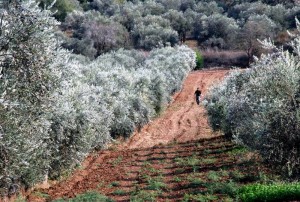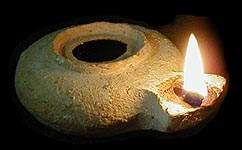Eggs
We’re taking a little break from the Bendatovich Egg Farm. Their young brood is taking its first steps and laying tiny eggs. While we let them learn the art of egg-laying, we’ll take a short hiatus from deliveries.
Sourdough Bread
Manu, our bread baker, is on Hanukah vacation, so no bread-baking this week. Your orders for next week are welcome.
______________________________________
It is better to light a single candle than to curse the darkness
-Eleanor Roosevelt
Hanukah, the Hebrew holiday of light and fire, is parallel to similar holidays in other cultures. Somehow every year come winter, when the darkness prevailed, people felt the need to light a candle and remind themselves that despite the gnawing glum, the days of light will come. Simply, quietly, gradually, one-by-one, in a “progressively increasing” manner, the calm and modest light of the Hanukah candles grows.
To me, this holiday is a reminder of how little one needs to lighten the hardship and cruelty, to dismantle it, to find a soft corner within it. Like a small, thin candle which conquers the darkness the moment it is lit, this is a holiday which celebrates the victory of moderation. It tells us that sometimes so very little is needed to make so much light– only one small flask of oil, a few good intentions and the willingness to believe and give, a little goodwill and love to drive away loneliness or to break into laughter (and it’s already been said that the difference between one friend and no one is infinite).
I’m aware that Hanukah, like other holidays and any other day, has turned into a festival of shopping and gifts. During my years in the U.S., I saw Jewish parents trying to keep up with their friends celebrating Christmas by buying many gifts, some for each day. Here, too, this holiday has become a parade of fireworks and giant-size flames, parties and gifts.
I feel that this is so contrary to the original intent of these days, as we celebrate the end of olive-harvest season, where the fruit of what is probably the most modest and self-denying tree is gathered to the olive press. This is the tree that hardly requests anything and stands sturdy and graceful for years on end. Dry or rainy, hot or cold, the olive tree can endure it all and still come out strong. Silently, this survivor produces olives that bring us oil for our light, food for our health, balms for our wounds, softeners for our skin, and more.
And it really is so beautiful, because the season of the olive harvest is the last in the chain of harvest seasons: we’ve reaped, gathered, picked, pruned, and collected all the bounty of our fields into the storehouses and the wine press, shone with pride over our successes or worried over our failures. And at the finale of this drama, voila, the season of the olive harvest debuts. There wasn’t much to do here, except mainly to hope for an appropriate measure of cold weather and rain, and a nice, hard “first and second rain” to wash off the olives.
Modestly, silently, we harvest these hard fruits, which will burst with juice if we press hard on them, but not the kind of juice you want to lick off your fingers, like from grapes, figs, pomegranates or dates. This is a strange and bitter juice which will strengthen our bodies in the long run, much more that the sugar of sweet fruits. It will light our long winter nights. The olive harvest does not need sweet festivals; this is a time of winter and introspection, to the quiet softness of a flickering candle flame.
It really is amazing to see golden oil burst out of such hard, un-tempting fruits. But in all honesty, it doesn’t start out golden. A rather disgusting sediment produces a rather foul, dirty liquid. Only after it sits in the dark does the oil separate from the dirty water and float above it, pure and light. This process is really magnificent and symbolic. It teaches us a lot about what can seem futile or vain and what you can produce when you actually try, sometimes with effort and obstinacy; give it a chance, and let time run its course without our interference. And then there’s all that health, goodness and light to be found at the end of the process….
In honor of the holiday of olive oil, I am including a beautiful PowerPoint presentation of olive oil cultivation in olden times and now, made by Yoav Balshai, a good friend from a neighboring moshav who grows olives and cultivates olive oil. I learned a lot from the presentation and enjoyed it, and hope you will as well. (Click on the picture to take you to the presentation (in Hebrew). Thank you, Talya, the website wizard, for your technical counsel!)

Wishing us all the ability to light a small candle
For us
For those who love us
And to illuminate those who seem hated and hateful, threatening, strange. Perhaps we will also see a light shining our way from the other side, trying to illuminate us and find within us a smile and great healing.
Wishing a modest, familial, heartwarming and joyful holiday,
Alon, Bat Ami, Ya’ara and the Chubeza team
WHAT’S IN OUR HANUKAH BOXES?
Monday: Lettuce, leeks, celery, tomatoes, coriander, cucumbers, spinach, kohlrabi, carrots, sweet potatoes, daikon (small boxes only)
In the large box, in addition: cabbage, broccoli, tatsoi, beets
Wednesday: cabbage, lettuce, green onions, fennel, parsley or cilantro, cucumbers, sweet potatoes, Swiss chard or New Zealand spinach, tomatoes, kohlrabi, celery- small boxes only
In the large box, in addition: carrots, beets, broccoli, daikon
And there’s more! You can add to your basket a wide, delectable range of additional products from fine small producers: granola and cookies, flour, sprouts, goat dairies, fruits, honey, crackers, probiotic foods, dried fruits and leathers, olive oil, eggs and bakery products too! You can learn more about each producer on the Chubeza website. On our order system there’s a detailed listing of the products and their cost, you can make an order online now!
______________________________
Chanukah Latkes—Not Just Potatoes, and Not Just Fried:
Personally, I bake my latkes – 15 minutes at 180C degrees, turn them over, bake 15 min. more and then taste to see if 5-10 more minutes are needed.

